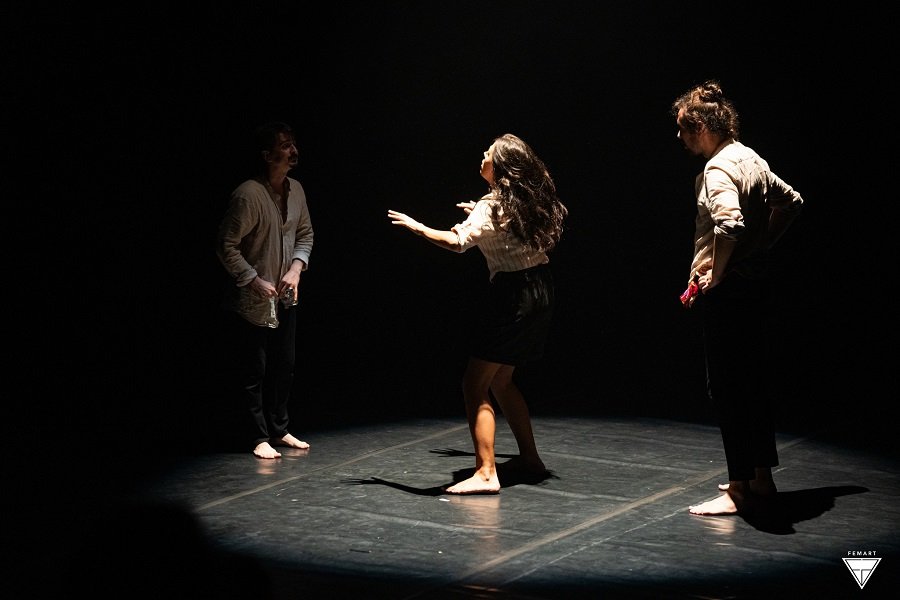By: Shqipe Malushi
In the heart of Prishtina, the Oda Theater witnessed an unforgettable evening where the boundaries between tradition and rebellion collided, giving birth to an artistic revolution. As the clock struck 20:00 on Day 2 of the FemArt Festival, the stage was set for a dance theatre performance that would leave no soul untouched. The air crackled with anticipation, and what unfolded was nothing short of breathtaking—a gripping narrative woven into the fabric of Kosova’s ancient traditions and its unyielding patriarchy.
Directed, conceptualized, and choreographed by the visionary Robert Nuha, and written by the masterful playwright and activist Zana Hoxha, “O Lord, O Lord, O Lady of the House” is not merely a performance. It is a daring confrontation with the oppressive laws of inheritance that have long cast women as mere shadows in their own homes. Here, the Kanun—a set of ancient, patriarchal laws—comes under fire for reducing women to objects, with no voice, no rights, and no inheritance.
As the play begins, two aging family men, along with their sons, debate the future of their ancestral land and a ring—a ring that, by all logic, should belong to the daughter. But in this world, women aren’t considered. The brothers plot to exhume their father’s grave, intent on claiming what they deem rightfully theirs. Yet, the sister—played with fierce intensity by Altina Binaku—has already taken the ring, not as an act of theft, but of reclamation. She is a force, a symbol of the fight for women’s rights, standing tall in the face of generations that have silenced her.
As the brothers’ greed intensifies, they find themselves haunted by shadows of the past, unable to shake the traditions that bind them. But the sister moves through time with the power of the ring, challenging the very foundations of their beliefs. The stunning choreography, crafted by Robert Nuha, transcends the stage, fusing dance and dialogue in a dynamic interplay that journeys across time and space. Altina Binaku and Lavdie Idrizi, through their dual roles as video performers and vocalists, draw us deeper into this emotional labyrinth—a haunting exploration of greed, memory, and the enduring power of womanhood.
The performance was elevated to new heights by the brilliant acting of Edlir Gashi and Labinot Raci, whose transformations—from old men steeped in tradition to young brothers consumed by greed—were seamless and heart-wrenching. Their journey mirrored that of so many men who have been conditioned to value possessions over family, only to be undone by the very laws they sought to uphold.
But it is the ensemble, including Patriot Osmani and Enis Mulaku, the shadows of the past who delivered a performance that was not only instinctive but profound. They embodied the full spectrum of human experience—love, power, greed, loss—leaving the audience mesmerized.
The Artpolis – Art and Community Center Production, with technical support from Elira Lluka, offered a flawless execution. Every element—from the digital projections to the evocative music—was perfectly set, creating a portal to the past while reflecting the present. The laughter that echoed through the theater, the tears shed, and the collective gasps all testified to the play’s power.
“O Lord, O Lord, O Lady of the House” is not just a call for gender equality. It is an ode to the strength of women, a reclamation of rights long denied, and a reminder that the laws of men pale in comparison to the bonds of family and love. This performance challenges us to look at ourselves and ask—how far have we come, and how much further must we go?
As the curtain fell, the energy in the theater remained electric. The audience had been on a journey—not just through the story on stage, but through the shared experiences of women across generations. It was an evening where art became activism, where performance became protest, and where the past met the future in a dance of reckoning.
This extraordinary production stands as a testament to the resilience of women, and to the transformative power of art. It is a story of tradition, of resistance, and ultimately, of hope.
Kosova has given the world many things, but this—this performance—is a gift to all who believe in the power of change. Thank you Artpolis, FemArt 12 and all the creators of this magic night.

